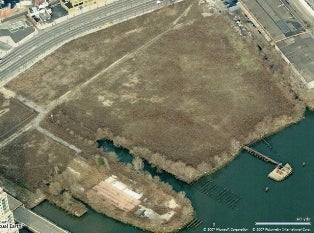Casino lawsuits’ twists and turns

Foxwoods aeriel view
Jan. 29
Rendell calls council stance gutless
Casino-Free Philadelphia challenges the governor
By Kellie Patrick Gates
For PlanPhilly
Philadelphia still faces a lawsuit that was filed after its Commerce Department gave SugarHouse Casino a permit to build on riverbed land – even though the city revoked that permit last week.
“We really think it’s a moot point since we revoked the licenses,” said Maura Kennedy, a spokesperson for Mayor Michael Nutter. The city filed a brief with the Supreme Court stating as much shortly after Nutter announced the permit decision Friday.
But state Rep. Mike O’Brien – one of the cadre of local legislators who filed the lawsuit in late December, said the case is not about whether a permit exists, but who has the right to grant one. The legislature does, he says, and the city does not. The city disagrees.
When making last Friday’s announcement, Nutter criticized the administration of former mayor John Street for its handling of the permit, saying errors were made and the decision was rushed. But Nutter’s legal staff agrees with Street’s — and SugarHouse’s — that a 1907 law gives the city the right to make the call on riparian rights.
“The city does have a right to decide, it was just done improperly,” Kennedy said.

Sugarhouse aeriel view
Historically, the right to build a project the size of SugarHouse on riverbed land – also called riparian or submerged lands – has been granted through an act of the state legislature. But tradition holds that only a legislator representing the district where a project is located introduces that legislation. None of the local contingent were anywhere close to doing that for SugarHouse when the casino’s attorneys found the 1907 law and applied to the City Commerce Department.
The legislators and their legal experts maintain that newer laws – including the Administrative Code of 1929 and the Dam Safety and Encroachment Act of 1978 – override the old law.
“The initial cause for action no longer stands, (but) the overriding principle of law does,” O’Brien said, and thus the lawsuit will go on.
In another twist, SugarHouse officials are now using the lawsuit filed when their revoked riparian rights license was issued to argue that the license should stand.
“We have been advised by our legal team that the City’s action to rescind our submerged lands license is contrary to law given the pending litigation surrounding that license,” said Greg Carlin, chief executive officer of HSP Gaming, the company developing the casino.
Nutter anticipates the Commerce Department will take a second look at whether SugarHouse should have a license to build on riverbed lands. SugarHouse has 30 days to appeal the revocation, and that appeal would launch the process, Kennedy said. She said there would be at least one public hearing.
SugarHouse executives don’t think they should have to appeal the revocation, because they believe the permit should stand. They filed a brief with the Supreme Court detailing these arguments.
Spokeswoman Leigh Whitaker said SugarHouse has not yet decided whether it will file an appeal, anyway. “We’re exploring all of our options,” she said.
Philadelphia’s other proposed riverfront casino, Foxwoods, may also find itself in a riparian rights battle – even though officials say they do not need to build on the submerged lands.
Foxwood’s changed its original proposal by pulling in a promenade, and so, officials have said, they no longer need riparian rights.
But some state and local leaders disagree.
In fact, the very day that Nutter announced SugarHouse’s submerged lands license had been revoked, City Councilman Frank DiCicco introduced city legislation that would give Foxwoods the zoning it needs to build. But DiCicco’s proposal contains several conditions that Foxwoods must meet first, and one of them is that they are granted riparian rights, via the state legislature.
DiCicco’s spokesman Brian Abernathy said last week that Foxwoods first proposal, which required riparian rights, was a better design and the one that was approved by the Gaming Control Board.
Abernathy predicted that Foxwoods wouldn’t like the conditions on the proposal, which must make it through committee and then be read twice more before city council before it could be adopted. He was right.
Foxwoods spokeswoman Maureen Garrity said in written statements that the riparian rights condition and the others are unlike anything that council has demanded of a zoning applicant up to this point, and therefore unlikely to hold up in court.
“We believe very strongly in our legal position, and we believe the City will have a difficult time in abandoning the position it has consistently taken in this case and in its last two filings with the Supreme Court,” she said.
It was the Supreme Court that gave SugarHouse the zoning it needed, saying that the city had intentionally stalled for too long. That ruling prompted DiCicco to submit the zoning proposal, in hopes that the city would retain some power in the matter. The zoning is necessary before Foxwoods can move very far, because the zoning permit is a prerequisite of others. Foxwoods has not received any of the permits it needs yet, but “we’re working with (the state’s Department of Environmental Protection) to determine the appropriate permits for our project,” said Garrity. Foxwoods is also working with the city’s water and sewer departments, she said.
O’Brien believes even Foxwoods’ amended plan actually requires riparian rights. Regardless of what happens with City Council, if Foxwoods begins construction without securing riparian rights, O’Brien pledged to seek a restraining order and file a lawsuit “as soon as they put a spade in the ground.”
Contact the reporter at kelliespatrick@gmail.com
WHYY is your source for fact-based, in-depth journalism and information. As a nonprofit organization, we rely on financial support from readers like you. Please give today.






